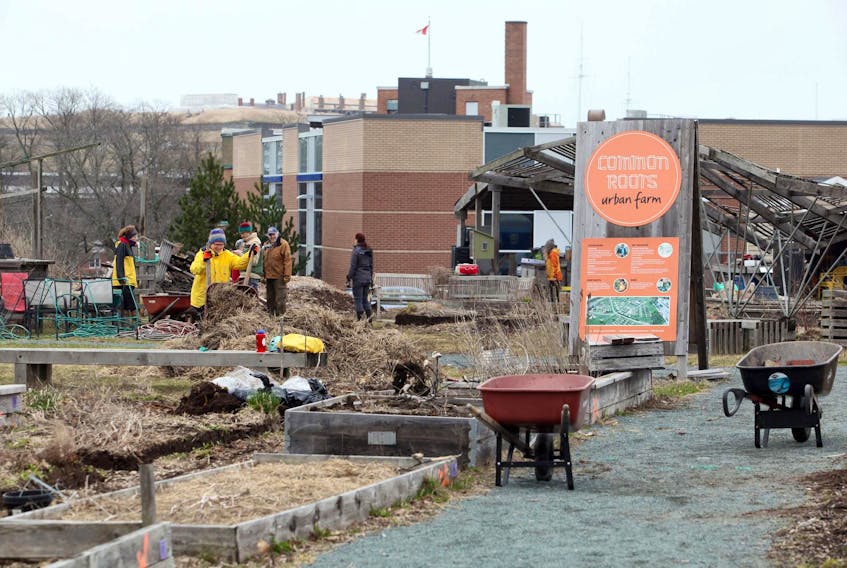Last week, I walked by the former Common Roots Urban Farm site, beside the Halifax Infirmary, that is usually in full bloom by now. It is just brown/grey and empty. The garden was moved to the concrete and asphalt jungle at the intersection of a multi-lane highway, Bayers Road and a mall. It was moved from its Commons location to make room for the QEII Health Sciences Centre redevelopment. The highly visible care-for-your-health, locally grown, fresh, no-long-distance-transport-required produce from the garden will be replaced by the voracious demands of the reactive disease care system. Hospitals do not provide “health care.” They are there for disease and injury.
I worked as an emergency physician at the VG and HI for almost 30 years, unquestioningly responding to the emergent needs of sick and injured patients. Near the end of my clinical career, I realized that the social determinants of health — factors mostly related to society values and political policies — are causing a lot of what ends up in the disease care system. While we like to blame people’s personal choices, that is a small fraction of the problem. Working more or longer shifts and hiring more staff is not the solution. Demand will continue to grow and supply, well, we read and hear about that every day — more doctors and nurses will not miraculously appear.
The new Canada Food Guide and exploding research... are challenging the status quo. But the status quo of making money from sick people and marketing low-quality food does not like to be challenged.
How does the local, organic, plant-based healthy produce of Common Roots compete with the trillion-dollar medical, industrial and agricultural industrial complexes? While a few lucky people have garden plots at Common Roots, and a few more get their produce from local farmers, the vast majority get food that is overpackaged, processed and trucked in. “Food as entertainment” — taste, smoothness, sweetness, smell, brain dopamine release — is more important than actual nutritional value. They tend to be low nutrient, full of chemicals and create a lot of garbage — but taste oh-so-good. And it is affordable, for most. For some fellow Nova Scotians, however, the social determinants are highlighted by the Halifax Food Policy Alliance (www.halifaxfoodpolicy.ca): 73.5 per cent of Nova Scotia households on income assistance experience food insecurity; the average distance food travels to HRM is 4,000 km; 17,000 people, one-third of them children, were supported by food banks in Nova Scotia.

The new Canada Food Guide and exploding research on the critical importance of our gut bacteria, nutrition and health are challenging the status quo. But the status quo of making money from sick people and marketing low-quality food does not like to be challenged. The sad irony is that we are all complicit in a complex system that is making us sick. We want the lowest price, convenience, taste, and to be told it is healthy by fake marketing and packaging. Examples — labels such as “all natural,” “organic,” “fortified with essential vitamins” and multi-billion-dollar gluten-free fad diets are examples. Many of those products take original whole foods, process and reconstitute them, losing most or all of the natural nutrients, then reassemble all the parts into “Frankenstein food,” so it can sit in a bottle, box or freezer pack for months, or years. Did our bodies evolve over millions of years, constantly moving, gathering mostly plants and occasional meat, to all of a sudden, in the last 50-plus years, be eating frozen pizza? Why are we sick? Really?
I have mostly withdrawn from the rampage of the local disease care “crisis.” It is not solvable until we start reducing the supply of sick people.
“But the label says it’s good, and it’s cheap, so I will buy it.”
I have mostly withdrawn from the rampage of the local disease care “crisis.” It is not solvable until we start reducing the supply of sick people. While that depends in part on personal choices, the majority depends on public policy, strong visionary leadership, support for local agriculture, addressing food insecurity and confronting the fact that our loosely regulated free market economy directly competing with a fair, more equitable and broadly productive society cannot co-exist.
Fellow humans are labelled as consumers. We sadly call ourselves consumers. If we do not ask a lot of questions, demand profound policy change and push back corporate control of everything we do, including what we put in our bodies, then we are what I saw at Dartmouth Crossing the other day — consumer zombies.
An urban farm, with many small plots, provides outside physical activity, social engagement, purpose, carbon capture and low-cost healthy foods. That is HEALTH CARE. What happens inside hospitals is not.
RELATED:








